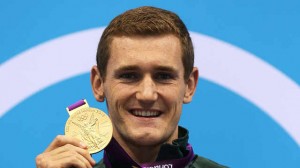South Africa: Van Der Burgh Captures Olympic Gold
 South Africa’s Cameron van der Burgh swam “the perfect race” to capture Olympic gold in the 100 meters breaststroke in London on Sunday evening, winning the final in a world record time of 58.46 seconds.
South Africa’s Cameron van der Burgh swam “the perfect race” to capture Olympic gold in the 100 meters breaststroke in London on Sunday evening, winning the final in a world record time of 58.46 seconds.
Christian Sprenger of Australia finished strongly winning silver in a time of 58.93 and American Brendan Hansen claimed bronze in 59.49.
After touching the wall, Van der Burgh turned around, his eyes searching for the result on the scoreboard. Seeing his name atop the standings, and in a world record time, his features broke into a grin that never left his face the rest of the evening.
Took in the scene
He raised his arms in triumph and acknowledged the cheers and clapping of the crowd. Then, he laid himself back along a lane divider, rested his head against the side of the swimming pool and took in the scene while lying on his back.
Twenty-five minutes later, at the medal ceremony, the smile remained etched on Van der Burgh’s face as he received his gold medal. When the South African flag was raised, he quietly sang the anthem.
Van der Burgh’s victory ensured that the 2012 London Olympics will be more successful for South Africa than the Games of 2008 in Beijing where Khotso Mokoena was the sole medal winner, with a silver in the long jump.
Fifth Olympic swimming gold for SA
His victory was only the fifth Olympic gold medal in swimming for South Africa, following in the footsteps of 1952 100m backstroke winner Joan Harrison, 1996 100m and 200m breaststroke champion Penny Heyns, and the men’s 4 by 100m freestyle relay team of 2004. It means he is the first South African to win an individual men’s swimming title.
In the lead up to the final, Van der Burgh faded a little towards the end of his qualifying heat, but qualified for the semi-finals with a strong time, nonetheless, of 59.79 seconds.
In the semi-finals, however, he raised the bar, clocking an Olympic record of 58.83 seconds to become the only swimmer to go under 59 seconds ahead of the title-deciding race. His time was a big 0.61 seconds clear of the next fastest qualifier, Fabio Scozzoli of Italy, who touched the wall in 59.44.
World record
That suggested that Van der Burgh could win gold, but Olympic finals can overwhelm some. Not Van der Burgh, who produced a sublime performance to lift the title in a time that bettered the three-year-old world record set by Australian Brenton Rickard in the “swimsuit era”, when records fell left, right and center as technology played a role in lowering numerous world records.
The South African breaststroke ace now owns the world records in the 50m and 100m breaststroke in both long course and short course swimming pools.
From the start of Sunday’s final, Van der Burgh set the pace, leading through 25 meters. By the 50 meters mark, he had opened a lead of over half-a-second. The South African star was especially impressive over the third 25 meters, extending his advantage. He then held his form to take victory in a time never before matched.
Training adjustment
Van der Burgh’s traditional strength has been his speed, which has made him more suited to the 50 meters, but the 50 meters breaststroke is not an Olympic event, so he had to adjust his training to suit the 100 meters. Winning the title, he said, was four years in the making, but it was worth it.
“If there is such a thing as the perfect race, I think I swam it at the right time tonight,” he said after the final, which he swam in front of his family and a very vocal band of South African supporters.
“I don’t really care about the world record. It really doesn’t faze me,” he said.
“Once you become an Olympic champion, you join a club and they can never take it away from you. I can tell my kids when they are watching one day that I did that.”
Alexander Dale Oen
Van der Burgh also took time to remember his friend, Norwegian world champion Alexander Dale Oen, who died of heart failure at the end of April as a result of an undetected coronary heart disease.
“I just have to pay tribute to Alexander Oen tonight. I know he has been with me this year. I think he helped me finish the race in such a strong manner,” he said.
“Alexander pushed me in training. It made me realize I had to go faster to win the gold medal. That is what we trained for and that is what we have achieved.”
He added that he hoped his gold medal winning performance would help spur South African swimmers on to win more medals in the Olympic swimming pool. — allAfrica.com









